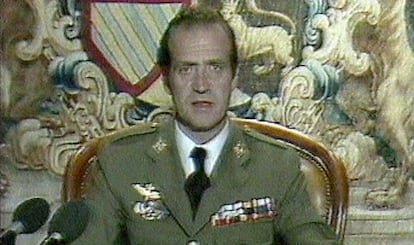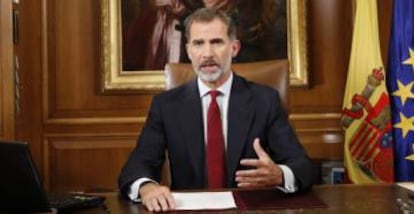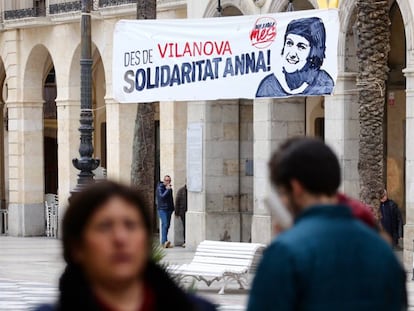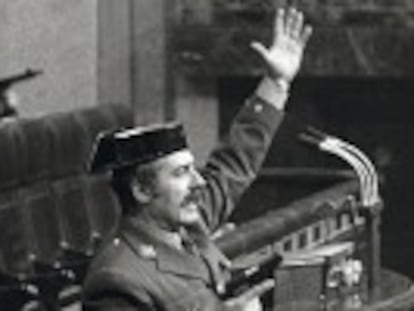Spanish king to son after 1981 coup: ¡°Felipe, I hope this never happens to you¡±
Thirty-six years after Juan Carlos gave famous TV address, his son did the same against Catalan secessionist bid

On February 23, 1981, a group of Civil Guard officers stormed Spanish Congress, took the deputies hostage and announced that a military coup was underway. For 18 hours, the world wondered whether Spain¡¯s fledgling democracy would be reverted. All eyes were on King Juan Carlos I, who had been appointed by the dictator Francisco Franco in the hopes that he would carry on with his own legacy. Instead, the young monarch made an impassioned defense of democracy and the Constitution, and the coup quickly fizzled out.
It was only in the early hours of February 24, when Juan Carlos felt that the coup had been quashed, that he allowed his 13-year-old son Felipe to go to bed. The crown prince had spent the entire evening and night with his father, watching him as, dressed in military uniform to underscore his position as head of the Armed Forces, he made a televised address to Spaniards that effectively stopped the coup in its tracks, as the coup plotters realized that the king would not support them.
The king, and nobody else, was the arbiter between Spanish democracy and destruction
Paul Preston, historian
When it was all over, Juan Carlos kissed his son goodnight and said: ¡°Felipe, I hope this never happens to you.¡±
Over 36 years later, Felipe VI surely recalled these words as it dawned on him that he, too, had to act against a new challenge to Spanish democracy. The Catalan separatist bid had crossed all the red lines, and Spain¡¯s Constitution-abiding parties could not agree on how to deal with it.
On October 1, 2017, the king watched the scenes unfold as people voted in an illegal independence referendum and riot police used violence against them on the streets of Barcelona, in images that made world headlines. He probably went to bed thinking that the time had come for him to make a similarly robust, public defense of the Spanish Constitution as his father had in 1981. The national address took place on October 3, when Felipe VI called on all Spaniards to defend national institutions and Spanish unity.
There were parallels between both speeches. ¡°The Crown, a symbol of permanence and unity of the homeland, cannot in any way tolerate acts or attitudes by individuals who aim to forcibly interrupt the democratic process encoded in a Constitution that the people voted on through a referendum,¡± said Juan Carlos on February 23, 1981.

¡°In light of this situation of extreme gravity, which requires everyone¡¯s commitment to the general interest, it is the responsibility of the legitimate powers of the State to ensure that constitutional order is maintained and that institutions continue to function normally, and that the rule of law and Catalan self-government are upheld on the basis of the Constitution and the Catalan Statute of Autonomy,¡± said Felipe VI on October 3, 2017.
The British historian Paul Preston, one of the world¡¯s top authorities on Spanish history and Juan Carlos I in particular, said that ¡°the king, and nobody else, was the arbiter between Spanish democracy and destruction.¡± When historians sit down to write about the first few years of Felipe VI¡¯s reign, they will probably say something similar about his October 3 message: that he acted as the arbiter between the institutions representing Spain and the disintegration of the State.
And while the 1981 coup was a direct attack against the heart of Spanish democracy, Juan Carlos I at least knew that his decision would be unanimously backed by Spaniards. By contrast, Felipe VI was aware that his own address would be harshly criticized by many Catalan citizens as well as by nationalist and far-left parties.
Yet Felipe VI felt he had to act to avoid the constitutional vacuum that Catalan secessionists were creating in Spain through their illegal actions. It was his own ¡°23-F moment,¡± and it consolidated his position as a firm defender of Spain¡¯s institutions, even if it came at the cost of eroding years of smooth relations with some segments of society in Catalonia, a region that he has many official and personal ties to. This coming Sunday, Felipe VI will travel to Barcelona in a bid to build bridges again.
English version by Susana Urra.
Tu suscripci¨®n se est¨¢ usando en otro dispositivo
?Quieres a?adir otro usuario a tu suscripci¨®n?
Si contin¨²as leyendo en este dispositivo, no se podr¨¢ leer en el otro.
FlechaTu suscripci¨®n se est¨¢ usando en otro dispositivo y solo puedes acceder a EL PA?S desde un dispositivo a la vez.
Si quieres compartir tu cuenta, cambia tu suscripci¨®n a la modalidad Premium, as¨ª podr¨¢s a?adir otro usuario. Cada uno acceder¨¢ con su propia cuenta de email, lo que os permitir¨¢ personalizar vuestra experiencia en EL PA?S.
En el caso de no saber qui¨¦n est¨¢ usando tu cuenta, te recomendamos cambiar tu contrase?a aqu¨ª.
Si decides continuar compartiendo tu cuenta, este mensaje se mostrar¨¢ en tu dispositivo y en el de la otra persona que est¨¢ usando tu cuenta de forma indefinida, afectando a tu experiencia de lectura. Puedes consultar aqu¨ª los t¨¦rminos y condiciones de la suscripci¨®n digital.










































